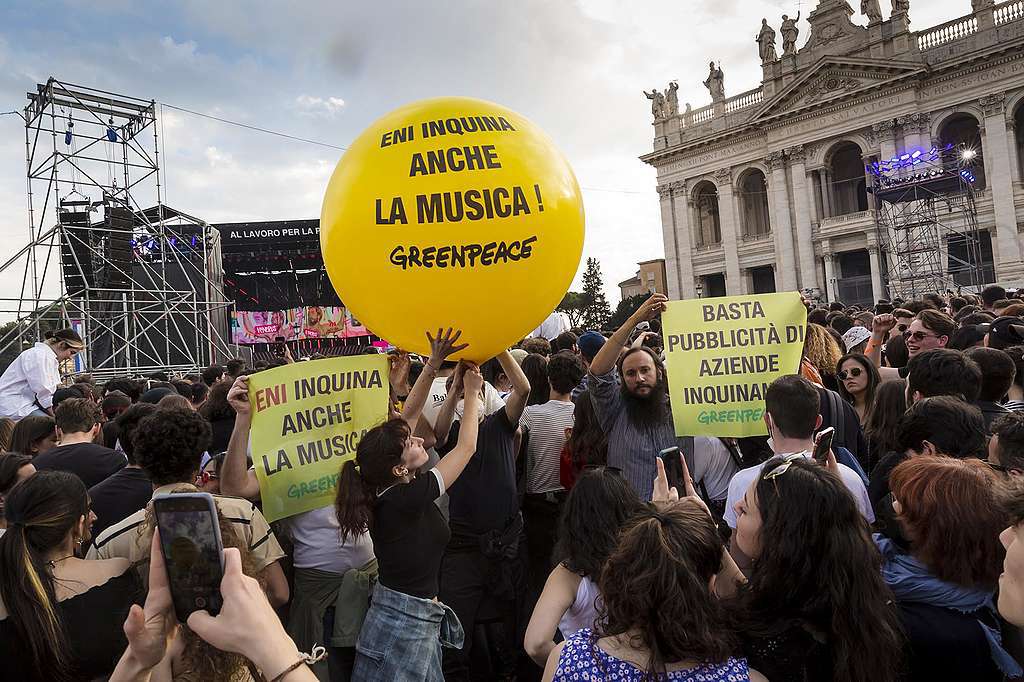We have written about them telling about those who fight against ‘fossil advertising‘, those who promote products, such as diesel fuels, from gas and oil. But also those of goods and services with a high carbon footprint (climate-changing emissions) such as cruises or airlines.
Campaigner for Reclame Fossielvrij, Charlotte Braat fights for limits to these polluting advertisements.
Charlotte Braat, when was Reclame Fossielvrij (Advertising without Fossils) born and why? Why do you think it is important to limit the advertising of products with a large carbon footprint?
Our organisation, Reclame Fossielvrij (Fossil Free Advertising), was born in 2020 out of Fossil Free Education and The Hague Fossil Free. These two organisations were fighting a children’s festival organized by Shell, called Generation Discover, which was hosted every year in the city of The Hague. Shell used the festival, which welcomed many school classes each year, to greenwash their image and at the same time communicate positively about oil and gas. Due to the activists pointing to the actual damage Shell was doing, more and more schools decided to boycott the event, and eventually the municipality stopped subsidizing the festival. After a couple of years of taking action against this festival, it was finally banned in 2019.
The activists involved were of course very happy they won, however they also realised that the fossil industry has many different ways to promote their polluting business and mislead the public and politicians about their green efforts. So they looked into the fight against another polluting and misleading industry, the tobacco industry. They found that the tobacco ad and sponsorship ban that has been introduced in most countries around the world was of crucial importance to changing our mindset about tobacco companies and their products. After the tobacco ad ban, after people weren’t constantly seeing glamorizing and misleading propaganda by the tobacco industry, the severe health effects finally were taken seriously. This again made way to subsequent policies, like a ban on smoking in schools and trains. Since then, Fossil Free Advertising has been taking action for a ban on fossil advertising, in the Netherlands and beyond.
What results have you achieved since then?
In 2020, Amsterdam became the first city to adopt a motion to ban fossil ads. This became world news. Many cities followed, from Sydney to Stockholm, Edinburgh to Montreal. The Netherlands now counts 16 municipalities who have taken steps against fossil ads, which is 1 in 20 Dutch municipalities. Not all fossil ads in these cities are currently banned already, as many ad contracts run up to 10 years, which is the main reason The Hague took a step further in September 2024. The Hague banned ads for fossil products and services by local law, again as first city in the world. This has resulted in an ad ban that went into effect a couple of days ago, 1st of January, 2025.
Next to pushing municipalities to ban fossil ads from their public space, we also encourage newspapers, cultural institutions and film houses to become climate frontrunners by banning fossil ads. Five national political parties have a ban on fossil ads in their party program. KLM has been successfully sued for greenwashing advertising by us, our friends at Fossielvrij NL (Fossil Free NL) and ClientEarth. We won numerous watchdog cases against Shell and KLM, showing that their ads are indeed misleading, while we also recognize that the watchdog system of industry selfregulation will never bring about the real change we need. We work with healthcare workers speaking out on a fossil ad ban, as they recognize fossil ads as the new tobacco ads. We support activists and campaigners in the Netherlands and abroad in fighting fossil ads and sponsorships where they live. We do all this as part of a vibrant and growing movement, with which we co-organized the last two annual gatherings.
Read also: Interview with Bill Baue: “2023 catastrophic year for sustainability standards”
There are many important and influential people who think that these advertisements should be banned.
All the successes of our movement, big and small, have lead WHO Director Public Health Maria Neira to publicly support a ban on fossil ads already in 2022, and UN Chief António Guterres to publicly call for a global fossil ad ban in 2024. And most importantly, they chip away the social licence to operate of the fossil companies, showing that they might be powerful, but that we can come together to effectively fight their ongoing pollution and climate crisis escalation.
You take the tobacco advertising ban as a model, but someone says: ‘There is a big difference: smoking is toxic and harmful to human health and has never benefited it. Fossil fuels, on the other hand, are still important for the economy’. What do you reply?
It is important to note that we are not advocating for a ban on fossil fuels from tomorrow on, but on a ban on fossil fuel promotion as soon as possible. We all know we have to move away from fossil fuels as fast as possible. How can we still accept the promotion of more fossil fuel use? It’s completely counterproductive.
We have to start by taking away the dangerously misleading and excessive promotion channels of the fossil fuel industry, before we can even claim to take climate action seriously. It is also important to note that fossil fuel companies don’t just advertise to mislead consumers, they advertise specifically to influence policy makers and politicians around important decision making processes, like elections or the international climate gathing COP. They sponsor football clubs and museums with donations that are very cheap for what they get in return, as millions of people associate fossil brands with joy and fun. For fossil companies, who have all the money in the world, ads and sponsorships are a very cheap way to buy public acceptance, a lovable appearance and even a sense of being unmissable to our world. Looking into their corrupt history, their unbelievably ongoing search of new oil and gas sources today and their very own investment records show differently, but who looks at those? Ads influence us subconsciously and uncontrollably, and they are so effective that positive impressions made by ads are often not adjusted when facing factual counter-evidence. It is no wonder the ad industry is ever growing.
This is also why EconomiaCirclare.com, with A Sud and Fondazione Openpolis launched the campaign “Clean the Cop! – Get the fossil lobbies out of the climate COPs” to ask the government and the Ministry of the Environment to stop accrediting at the climate COPs those who have interests opposed to decarbonisation and phase out oil, gas, coal.
Who supports your work, Charlotte?
We are supported by two funds (KR foundation and Energy Transition Fund-ETF) who focus on the root causes of climate change. They have identified a fossil ad ban as fundamental to tackling the climate crisis and support our work in The Netherlands and elsewhere in Europe.

Read also: Circular cities under review: what are the best European cases?
You call for a ban on advertisements for fossil fuels, cruises, combustion cars in the cities. But even in newspapers and magazines: why?
Newspapers and magazines have the very important role of honestly informing us and should be able to do critical and independent research. However, more and more you see big corporations, including the fossil industry, paying newspapers and magazines to be featured in advertorials. Advertorials are actually ads, but they are made to look as much as possible like normal articles, lending the trustworthy image of a newspaper to the often dubious message of a fossil company. Also ‘normal’ fossil ads in newspapers are problematic, as research shows that climate journalism is taken less seriously by readers if the newspaper also prints fossil ads. This intuitively makes sense. Even though newspapers will defend themselves saying there is a uncrossable wall between the sales and journalism departments, it is of course harder to bite the hand that feeds you.
More and more newspapers and magazines are banning fossil ads. The Swedish Dagens ETC already banned fossil ads in 2019, and actually gained 20% in subscriptions by taking that step. The Guardian (UK), Vox Media (US), Le Monde (France) and even the British Medical Journal have all taken steps against fossil ads, as have a growing number of Italian newspapers.
EconomiaCircolare.com does the same.
And in even more places, readers are calling their newspapers to ban fossil ads, in The Netherlands, Denmark and Germany for example. Newspapers and magazines have a crucial role to play in fighting the climate crisis. They can take a concrete and essential step by freeing their climate journalism from fossil ads.
LEGGI L’INTERVISTA IN ITALIANO/READ THE INTERVIEW IN ITALIAN
© Riproduzione riservata




